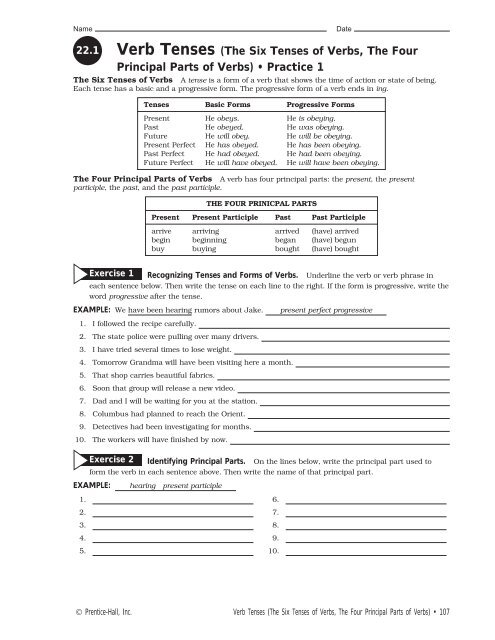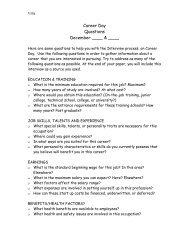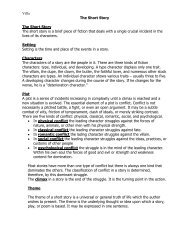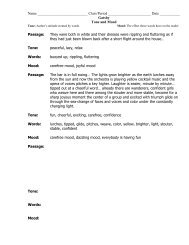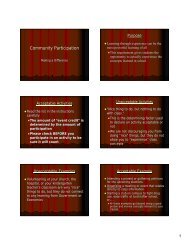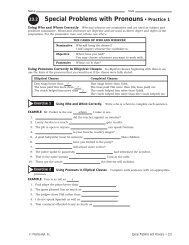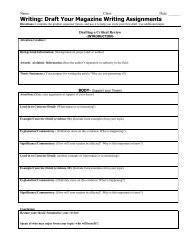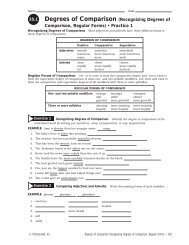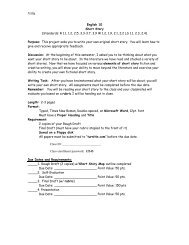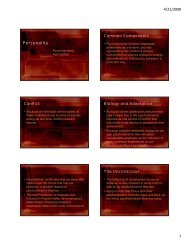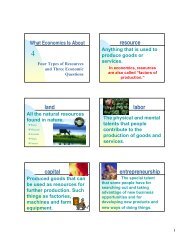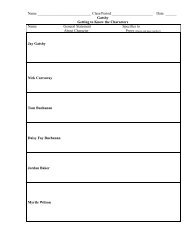grammar 2
grammar 2
grammar 2
Create successful ePaper yourself
Turn your PDF publications into a flip-book with our unique Google optimized e-Paper software.
Name<br />
Date<br />
22.1 Verb Tenses (The Six Tenses of Verbs, The Four<br />
Principal Parts of Verbs) • Practice 1<br />
The Six Tenses of Verbs A tense is a form of a verb that shows the time of action or state of being.<br />
Each tense has a basic and a progressive form. The progressive form of a verb ends in ing.<br />
Tenses Basic Forms Progressive Forms<br />
Present He obeys. He is obeying.<br />
Past He obeyed. He was obeying.<br />
Future He will obey. He will be obeying.<br />
Present Perfect He has obeyed. He has been obeying.<br />
Past Perfect He had obeyed. He had been obeying.<br />
Future Perfect He will have obeyed. He will have been obeying.<br />
The Four Principal Parts of Verbs A verb has four principal parts: the present, thepresent<br />
participle, thepast, andthepast participle.<br />
THE FOUR PRINICPAL PARTS<br />
Present Present Participle Past Past Participle<br />
arrive arriving arrived (have) arrived<br />
begin beginning began (have) begun<br />
buy buying bought (have) bought<br />
Exercise 1 RecognizingTensesandFormsofVerbs. Underline the verb or verb phrase in<br />
each sentence below. Then write the tense on each line to the right. If the form is progressive, write the<br />
word progressive after the tense.<br />
EXAMPLE: We have been hearing rumors about Jake.<br />
1. I followed the recipe carefully.<br />
2. The state police were pulling over many drivers.<br />
3. I have tried several times to lose weight.<br />
4. Tomorrow Grandma will have been visiting here a month.<br />
5. That shop carries beautiful fabrics.<br />
6. Soon that group will release a new video.<br />
7. Dad and I will be waiting for you at the station.<br />
8. Columbus had planned to reach the Orient.<br />
9. Detectives had been investigating for months.<br />
10. The workers will have finished by now.<br />
present perfect progressive<br />
Exercise 2 Identifying Principal Parts. On the lines below, write the principal part used to<br />
form the verb in each sentence above. Then write the name of that principal part.<br />
EXAMPLE: hearing present participle<br />
1.<br />
2.<br />
3.<br />
4.<br />
5.<br />
6.<br />
7.<br />
8.<br />
9.<br />
10.<br />
© Prentice-Hall, Inc. Verb Tenses (The Six Tenses of Verbs, The Four Principal Parts of Verbs) • 107
Name<br />
Date<br />
22.1 Verb Tenses (Regular and Irregular Verbs)<br />
• Practice 1<br />
Regular and Irregular Verbs<br />
the present form.<br />
A regular verb forms the past and past participle by adding -ed or -d to<br />
PRINCIPAL PARTS OF REGULAR VERBS<br />
Present Present Participle Past Past Participle<br />
cry crying cried (have) cried<br />
drop dropping dropped (have) dropped<br />
deprive depriving deprived (have) deprived<br />
grant granting granted (have) granted<br />
An irregular verb forms the past and past participle by changing spelling of the present form, not by adding<br />
-ed or -d to the present form.<br />
PRINCIPAL PARTS OF IRREGULAR VERBS<br />
Present Present Participle Past Past Participle<br />
hurt hurting hurt (have) hurt<br />
shut shutting shut (have) shut<br />
find finding found (have) found<br />
teach teaching taught (have) taught<br />
fly flying flew (have) flown<br />
sing singing sang (have) sung<br />
write writing wrote (have) written<br />
Exercise 1 Writing the Principal Parts of Irregular Verbs. Add the missing principal parts.<br />
EXAMPLE: rise rising rose (have) risen<br />
Present Present Participle Past Past Participle<br />
1. beginning<br />
2. drew<br />
3. freeze<br />
4. (have) run<br />
5. put<br />
6. thinking<br />
7. (have) fallen<br />
8. catch<br />
9. bound<br />
10. speaking<br />
Exercise 2 Recognizing Principal Parts of Verbs. Fill in each blank with the correct verb form<br />
from those given in parentheses.<br />
EXAMPLE: The final bell hasn’t rung yet. (rang, rung)<br />
1. Our water pipes during the January freeze. (burst, busted)<br />
2. We the blanket on the sand. (spread, spreaded)<br />
3. Paula her foil at her opponent’s vest. (thrust, thrusted)<br />
4. Brenda has in competitions for years. (dived, dove)<br />
5. Someone has into the computer file. (broke, broken)<br />
© Prentice-Hall, Inc. Verb Tenses (Regular and Irregular Verbs) • 109
Name<br />
Date<br />
22.1 Verb Tenses (Conjugating the Tenses) • Practice 1<br />
Conjugating the Tenses A conjugation is a complete list of the singular and plural forms of a verb. A<br />
short conjugation lists just the forms that are used with a single pronoun. As you study the following short<br />
conjugations, note that the verbs used with you are also used with we and they. The verbs used with she,<br />
likewise, are also used with he and it.<br />
SHORT CONJUGATIONS<br />
Basic, Progressive, and<br />
Emphatic Forms go (with I ) go (with you ) go (with she )<br />
Present I go You go She goes<br />
Past I went You went She went<br />
Future I will go You will go She will go<br />
Present Perfect I have gone You have gone She has gone<br />
Past Perfect I had gone You had gone She had gone<br />
Future Perfect I will have gone You will have gone She will have gone<br />
Present Progressive I am going You are going She is going<br />
Past Progressive I was going You were going She was going<br />
Future Progressive I will be going You will be going She will be going<br />
Present Perfect Progressive I have been going You have been going She has been going<br />
Past Perfect Progressive I had been going You had been going She had been going<br />
Future Perfect Progressive I will have been You will have been She will have been<br />
going going going<br />
Present Emphatic I do go You do go She does go<br />
Past Emphatic I did go You did go She did go<br />
Exercise 1 Conjugating Verbs. Complete each of the following short conjugations, giving all six<br />
basic forms and the first three progressive forms.<br />
1. try (with I ) 2. find (with he) 3. speak (with we) 4. run (with they)<br />
Exercise 2 Supplying the Correct Verb Form. Fill in each blank with the form of each verb<br />
given in parentheses.<br />
EXAMPLE: I will be studying French next year. (study, future progressive)<br />
1. We our theory in the lab. (test, future perfect)<br />
2. The lake during the first week in January. (freeze, past)<br />
3. Dad the mantel clock already. (wind, present perfect)<br />
4. Uncle Ed dinner on Friday. (prepare, past emphatic)<br />
5. The candidate lower taxes. (promise, past perfect)<br />
© Prentice-Hall, Inc. Verb Tenses (Conjugating the Tenses) • 111
Name<br />
Date<br />
22.1 Expressing Time Through Tense (Uses of<br />
Tense in Future Time) • Practice 1<br />
Uses of Tense in Future Time<br />
conditions.<br />
The four forms that express future time show future actions or<br />
USES OF TENSES IN FUTURE TIME<br />
Verb Forms Uses Examples<br />
Future Future event Grandma will visit us next week.<br />
Future Perfect Future event before We will have finished our chores before<br />
another<br />
lunch.<br />
Future Progressive Continuing future event The scouts will be selling cookies all of<br />
next month.<br />
Future Perfect Continuing future event By opening night, the actors will have<br />
Progressive before another been rehearsing for six weeks.<br />
Exercise 1 Identifying the Uses of Tenses in Future Time. Identify the use of the verb in each<br />
sentence, using the labels in the chart above.<br />
EXAMPLE: The weather tomorrow will be perfect. future event<br />
1. The circus will be coming to town next week.<br />
2. The roofers will have delivered the shingles by noon.<br />
3. Thestoreswillbestartingtheirwhitesalesnextweek.<br />
4. The whole family will go out for dinner.<br />
5. Soon we will have been waiting here for an hour.<br />
6. A new catalog will be arriving shortly.<br />
7. Jason will have completed his research by then.<br />
8. Next year, Ali will have been performing for a decade.<br />
9. Jodi will be visiting several colleges next weekend.<br />
10. By dinnertime, the gelatin will have set.<br />
Exercise 2 Using Tenses in Future Time. Fill in each blank with the indicated form of the verb<br />
in parentheses.<br />
EXAMPLE: The President will address Congress tonight. (address, future)<br />
1. A local restaurant the party. (cater, future progressive)<br />
2. A real disc jockey records. (play, future progressive)<br />
3. By midnight, they on the flagpole for seventeen hours. (sit, future perfect<br />
progressive)<br />
4. The shipment you ordered soon. (arrive, future progressive)<br />
5. Surely you Tanya to the party. (invite, future)<br />
6. Before the play, we the town with posters. (paper, future perfect)<br />
7. This term, I six credits. (take, future progressive)<br />
8. By the time we get there, all the singers . (perform, future perfect)<br />
9. Theteam itsfirstgameonSaturday.(play,future progressive)<br />
10. Mom your call when she gets back. (return, future)<br />
© Prentice-Hall, Inc. Expressing Time Through Tense (Uses of Tense in Future Time) • 117
Name<br />
24.2 Pronoun and Antecedent Agreement<br />
(Between Personal Pronouns and Antecedents) • Practice 1<br />
Agreement Between Personal Pronouns and Antecedents A personal pronoun must agree with<br />
its antecedent in person, number, and gender. Use a singular personal pronoun with two or more singular<br />
antecedents joined by or or nor. Use a plural personal pronoun with two or more antecedents joined by<br />
and. When dealing with pronoun-antecedent agreement, do not shift either person or gender. When gender<br />
is not specified, use the masculine or rewrite the sentence.<br />
PRONOUN-ANTECEDENT AGREEMENT<br />
Date<br />
My father has a CB radio in his truck.<br />
This air mattress has a leak in it.<br />
Francine got an A on her essay.<br />
Beth or Ellen will have the party at her house.<br />
Tim, Aaron, and Steve rode their bikes to the fair.<br />
Each candidate stated his position clearly.<br />
Both candidates expressed their positions clearly.<br />
Exercise 1 Choosing Personal Pronouns to Agree with Antecedents. Assume that each item<br />
below is an antecedent for a personal pronoun. After each, write his, her, its, ortheir to show which<br />
pronoun you would use to refer to it.<br />
EXAMPLE: David or Goliath<br />
1. several parents<br />
2. the new bike<br />
3. either Jack or Bill<br />
4. Pam, Ali, or Elise<br />
5. only one woman<br />
his<br />
6. Erik and Marc<br />
7. each actor<br />
8. most experiments<br />
9. the new report<br />
10. the ballerina<br />
Exercise 2 Pronoun-Antecedent Agreement in Sentences. Write an appropriate personal<br />
pronoun to complete each sentence.<br />
EXAMPLE: Pete and I enjoyed our trip to Washington, D.C.<br />
1. Although Ben had studied hard, was still nervous about the test.<br />
2. The pool is beautiful, but no one uses .<br />
3. Neither Dora nor Carol uses calculator very often.<br />
4. The candidate and her staff revised travel plans.<br />
5. Uncle Al takes dog everywhere.<br />
6. Pete hopes that will get the part.<br />
7. All students must show proof that have been immunized.<br />
8. Liz, may I borrow history notes?<br />
9. Mary has been practicing all week for recital.<br />
10. Maybe Chuck or Don will lend you bike.<br />
© Prentice-Hall, Inc. Pronoun and Antecedent Agreement (Between Personal Pronouns and Antecedents) • 139
Name<br />
Date<br />
24.2 Pronoun and Antecedent Agreement (Four<br />
Special Problems in Pronoun Agreement) • Practice 1<br />
Four Special Problems in Pronoun Agreement A personal pronoun should always have a clear,<br />
single, close, and logical antecedent, either stated or understood.<br />
Problems<br />
They are predicting rain for tonight.<br />
DadtoldUncleAlthathe had a flat tire.<br />
Mom told Vera what she needed.<br />
In Paris you can see the Eiffel Tower.<br />
Corrections<br />
The forecasters are predicting rain for tonight.<br />
Dad told Uncle Al that Dad had a flat tire.<br />
Dad told Uncle Al that Uncle Al had a flat tire.<br />
Mom told Vera what Mom needed<br />
Mom told Vera what Vera needed.<br />
Visitors to Paris can see the Eiffel Tower.<br />
Exercise 1 Solving Special Problems in Pronoun Agreement. Underline the word or words in<br />
parentheses that more clearly complete each sentence.<br />
EXAMPLE: (They, The sportscasters) say the Cats don’t stand a chance.<br />
1. The rules specify that (you, entrants) must be 16 years of age.<br />
2. Dad called Mr. Sims back as soon as (he, Dad) got home.<br />
3. Please get the hamburgers and the napkins and put (them, the hamburgers) into the cooler.<br />
4. The guards object if (you, visitors) touch the exhibits.<br />
5. The scouts and their leaders decided that (they, the scouts) would sell candy bars.<br />
6. On all flights (you, passengers) get first-class service.<br />
7. The patient was relieved when (they, the doctors) told her the news.<br />
8. Mr. Kelly told Bruce what (his, Bruce’s) new job would involve.<br />
9. Regular exercise is important t o(your, everyone’s) good health.<br />
10. When will (they, the networks) begin the new season?<br />
Exercise 2 Correcting Special Problems in Pronoun Agreement. Rewrite each sentence<br />
below to correct any problems in pronoun agreement.<br />
EXAMPLE: Tom told Ed that he should have known better.<br />
Tom told Ed that Ed should have known better.<br />
1. What did they say when you called the hospital?<br />
2. That platter of food looks pretty with the parsley on it.<br />
3. In that ballet school, they expect you to practice four hours a day.<br />
4. Debbie assured Maureen that her report would be excellent.<br />
5. Why do they tell you to keep your seatbelts loosely fastened?<br />
© Prentice-Hall, Inc. Pronoun and Antecedent Agreement (Four Special Problems in Pronoun Agreement) • 143


